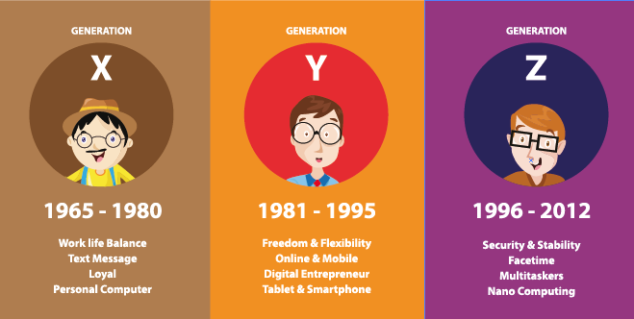About 17 million members of Generation Z are now adults and starting to enter the U.S. workforce, and employers haven’t seen a generation like this since the Great Depression. They came of age during recessions, financial crises, war, terror threats, school shootings and under the constant glare of technology and social media. The broad result is a scarred generation, cautious and hardened by economic and social turbulence.
Gen Z totals about 67 million, including those born roughly beginning in 1997 up until a few years ago. Its members are more eager to get rich than the past three generations but are less interested in owning their own businesses, according to surveys. As teenagers many postponed risk-taking rites of passage such as sex, drinking and getting driver’s licenses. Now they are eschewing student debt, having seen prior generations drive it to records, and trying to forge careers that can withstand economic crisis.
Early signs suggest Gen Z workers are more competitive and pragmatic, but also more anxious and reserved, than millennials, the generation of 72 million born from 1981 to 1996, according to executives, managers, generational consultants and multidecade studies of young people. Gen Zers are also the most racially diverse generation in American history: Almost half are a race other than non-Hispanic white.
Gen Z is reporting higher levels of anxiety and depression as teens and young adults than previous generations. About one in eight college freshmen felt depressed frequently in 2016, the highest level since UCLA began tracking it more than three decades ago. Smartphones may be partly to blame. Much of Gen Z’s socializing takes place via text messages and social media platforms—a shift that has eroded natural interactions and allowed bullying to play out in front of wider audiences.I am not sure what to think. But when it comes to the Church, there are both openings and challenges facing the way we reach this generation. The anxious character of this group may be a profound opening for the Gospel. The changeless Christ in a changing world has never gone out of style but at some points in time this is a clearer opening than others. The fact that they have been hardened by so much economic and social upheaval may mean that this group is harder to reach, harder to break through so that they can believe and rejoice. The media nature of both life and friendship presents typical challenges for a Gospel that is Word (largely oral) and worship that is as sensual as the splash of water and the taste of bread and wine. But the same could be said in varying degrees to most generations today. They are adverse to risk and it may seem to some that faith is simply too big a risk to take and at the same time the depression so common within this group may compel them to find peace outside themselves.
I cannot predict the future and I have serious doubts the WSJ can either. But I do know that God will continue to work through the means of grace, that the Holy Spirit is a match for all the adversities and adverse conditions we suffer, and that there is no other way than to faithful preach and teach this Gospel. If there is one thing this generation can smell, it is a phoney -- people who say one thing and act like another. Perhaps this may mean they will find entertainment worship a bore and look for something truly transcendent and for a hope that is bigger than getting a good life now. In any case, as much as it is good to know who they are, we do not change the message for the sake of the hearer. We proclaim Christ, the Way, the Truth, and the Life. To whom else can we go? He has the Word of eternal life and He alone.

No comments:
Post a Comment